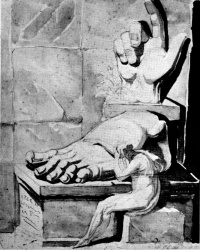Imitation
From The Art and Popular Culture Encyclopedia

|
"Originals are, and ought to be, great Favourites, for they are great Benefactors; they extend the Republic of Letters, and add a new province to its dominion: Imitators only give us a sort of Duplicates of what we had, possibly much better, before." --Conjectures on Original Composition (1759) by Edward Young "The only way for us to become great lies in the imitation of the Greeks" --Johann Joachim Winckelmann "We stand on the shoulders of giants" "Only animals who are below civilization and the angels who are beyond it can be sincere. Human beings are, necessarily, actors who cannot become something before they have first pretended to be it; and they can be divided, not into the hypocritical and the sincere, but into the sane who know they are acting and the mad do not." --The Age of Anxiety (1947) by W. H. Auden |

|
Related e |
|
Featured: |
Imitation is an advanced behavior whereby an individual observes and replicates another's. The word can be applied in many contexts, ranging from animal training to international politics.
In anthropology, diffusion theories explain why cultures imitate the ideas or practices of other cultures. Some theories hold that all cultures imitate ideas from one or a few original cultures, the Adam of the Bible, or several cultural circles that overlap. Evolutionary diffusion theory holds that cultures are influenced by one another, but that similar ideas can be developed in isolation.
In music, it refers to the repetition of a phrase played on one instrument or voice by another.
In mid-20th century, social scientists began to study how and why people imitate ideas. Everett Rogers pioneered diffusion of innovations studies, using research to prove factors in adoption and profiles of adopters of ideas.
Recent work in neuroscience has begun to reveal the mechanisms of imitation in the human brain. It seems that there is a system of mirror neurons which are active both when you see another person act and when you do the same thing yourself, and these may allow humans to learn by imitation.
It has been argued by Susan Blackmore in The Meme Machine, that imitation is what makes humans unique among animals. Imitation might have been selected as fit by evolution because those who were good at it had a wider arsenal of learned cultural behavior at their disposal, such as tool making or even language.
See also
- Appropriation (sociology)
- Articulation (sociology)
- Cognitive imitation
- Identification (psychology)
- Imitation (art)
- Mimesis
- Mimicry
- Modelling (psychology)
- The only way for us to become great lies in the imitation of the Greeks, a dictum by German art historian [[Johann Joachim Winckelmann
- Wannabe

